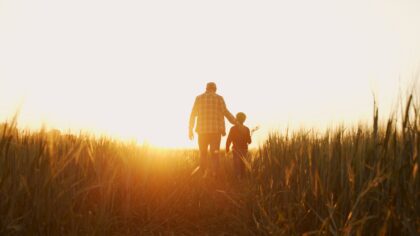For awhile now, the Worship Team has been considering including a land acknowledgment in our Sunday morning service introduction. I’ll admit that I’ve been concerned with accuracy. The histories of the indigenous peoples who called this region home are complicated.
At this year’s General Assembly, I was reminded about the point of land acknowledgments. And as much as I still value accuracy, that isn’t necessarily the top priority.
Just about everyone who spoke for any reason in the business sessions at General Assembly offered a brief land acknowledgment. Nothing complicated. Very basic and straightforward. But one speaker’s words landed kind of roughly with me.
This speaker’s land acknowledgment stated that the indigenous people of the region had been wiped out by diseases brought by French fur traders long before any people from the speaker’s lineage arrived. In other words, someone else was to blame. The speaker seemed to be guarding against feeling any sort of responsibility or shame by making sure the appropriate culprits were named.
And that speaker’s words were most likely accurate. But to me, they missed the point. The words seemed to be informed by a desire for self-protection rather than humble acknowledgment that many of us occupy land that has dubious provenance.
Northeast Ohio was colonized through the violent removal of its indigenous peoples. In some instances, this took the form of genocide. In others, indigenous people were forcibly relocated to reservations. Or to boarding schools, where their culture was essentially eradicated and replaced with the white culture of the time. That was the goal, at least.
When we offer a land acknowledgment, we aren’t taking responsibility for those actions. The intention is not for us to feel some sort of shame about something we didn’t do. Many of us might well have spoken up against the unjust treatment of people, even risking our own safety, had we been present.
At the same time, a land acknowledgment isn’t just a historical statement. In a land acknowledgment we name a persistent injustice that still affects the descendants of those indigenous people. We also name a moral injury to ourselves as people who have inherited a violent history we didn’t ask for. We acknowledge that at least some of what we have came to us in a way that conflicts with our life affirming values.
And maybe, in a land acknowledgment we admit in some small way that even though we didn’t make the mess, we can be a part of cleaning it up. Even though we didn’t cause the trauma, we can contribute to healing and restoration. We name a place of brokenness, not to beat ourselves up or cast blame away from ourselves, but just to say that this is another place our values might be calling us to pay attention and act as agents of wholeness.
The information for the land acknowledgment we’ve landed on for now also comes to us from Nancy Kelsey, a Clevelander and a member of the Ottawa tribe. She believes that we can all take pride in our heritage and ancestry, while at the same time acknowledging our complicated relationship to the land where we live. May we embrace this spirit as we continue exploring the sacred depths of that relationship.
Share this post:
